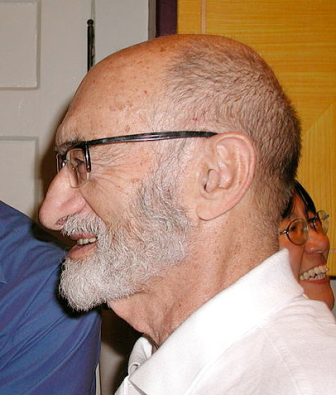on dr henry morgentaler, abortion, and the struggle for choice

Abortion often goes unaddressed in Canada for long stretches until something big happens to provoke the conversation. Last week was one of those times.
Dr Henry Morgentaler, an iconic abortionist and polarising Canadian figure died of a heart attack in his Toronto home on 29 May. He was 90.
Morgentaler was responsible for almost single-handedly changing the restrictive abortion law in Canada. It was overturned by the Supreme Court in 1988 and ruled unconstitutional. The decision dismantled the Therapeutic Abortion Committees in charge of deciding whether a woman could have the procedure.
Without his defiance, it may have taken a lot longer.
An immigrant from Poland and a Holocaust survivor (he has survived both Auschwitz and Dachau), Morgentaler began performing illegal abortions in Montreal in 1969 and continued to do so until his death.
His clinics were raided, he was arrested more than once, and had a non-guilty verdict overturned by the Quebec Court of Appeal in 1974, the first time in Canadian history. Even after his release, Morgentaler faced death threats. His Toronto clinic was firebombed and still today bulletproof doors protect his clinics.
But many young Canadians – those who grew up in the ’90s and giggled their way through sex-ed after the Millennium – rarely hear about the difficulties of an unwanted pregnancy a generation ago. The debate crops up now and then, of course: when the 25th anniversary of that landmark decision passed on January 28, when Morgentaler was awarded the Order of Canada in 2008, and in 2012 when Prime Minister Stephen Harper refused to challenge the lack of an abortion law.
When news of Morgentaler’s death broke, the “pro-life” faction came out in force on comment boards and social media sites in semi-celebration. Camera crews also sought them out for reaction.
‘Millions of lives have been lost because of his work,’ George Buscemi of Quebec Life Coalition told CTV News. A spokesperson for Campaign Life Coalition, the largest anti-choice organisation in Canada, told the Associated Press that she hoped his death would put an ‘end to the killing in Canada.’
‘Murder’, ‘baby-butchering’, ‘rights of the unborn’: the anti-choice movement worldwide relies on this rhetoric while overlooking facts that support the view that life is sacred and should be safeguarded – a view that is shared by the people they are fighting. There’s often nothing else behind the argument for criminalising abortion besides judgement.
The legalisation of abortion saves lives. It saves the lives of women who would otherwise turn to unqualified practitioners or cons. According to a report by the Guttmacher Institute, in 2012 almost half of all the abortions performed internationally were unsafe (defined by the World Health Organization as ‘a procedure for terminating a pregnancy that is performed by an individual lacking the necessary skills, or in an environment that does not conform to minimal medical standards, or both.’) It also saves the lives of children by increasing the chances that they are born to families that want and can care for them.
This is why “pro-life” is a misnomer. Life can’t only be about existence, but anti-choice arguments tend to stop before considering quality of life, especially for the mother.
The New Yorker made an argument in April for pro-informed choice, advocating for the right of women to terminate pregnancies in the case of ‘genetic abnormality’. This is a complicated argument with far more ethical considerations than can be outlined here, but as Andrew Solomon explains, in many cases the issue of whether to have a child lies in the barriers mothers and their partners must confront when they choose to give birth. In the case of severe disabilities, Solomon writes, ‘If we want people to keep these pregnancies, we might start by providing better services for people with disabilities.’
Pro-choice activists aren’t advocating for more abortions and they never have. And by refusing to incarcerate abortion providers, governments aren’t tacitly encouraging women to run out and get them. (Members of the Conservative Party were notably silent on Morgentaler’s passing.)
There is also no relationship between highly restrictive abortion laws and lower abortion rates, the Guttmacher Institute found. Before Morgentaler opened his first clinic more than 40 years ago, abortions were happening across the country, and they continue to happen around the world in countries where the procedure is illegal.
Instead of challenging liberalised abortion laws, those activists concerned with protecting life might find their time better spent addressing issues that lead to abortion.
Do something about income inequality and unaffordable childcare so that families can support their children should they choose to have them.
Do something to increase access to proper health care and birth control, the lack of which is responsible for most unwanted pregnancies in the developing world.
Do something to support comprehensive sexual education in schools so that teens make the right decisions when and if they decide to have sex (and encourage the organisations that do the same).
Do something about unhealthy attitudes toward sexuality so that women aren’t shamed into having abortions or giving birth in unsafe conditions.
Do something about the devaluation of girls so that sex-selective abortions don’t happen.
But definitely don’t scare women out of making a choice about their bodies or threaten the lives of trained professionals trying to keep them safe when they do.


Great article, was great to learn about Morgentaler, who I sadly had not even known of until just now.
It just always blows me away how the conservatives go out of their way to force women to carry pregnancies to term, no matter the situation, but then once the child is born, they have next to no interest in it. This is especially true if the child is born into poverty, or lower socioeconomic areas. God forbid these women then try and use tax payer dollars to help them raise their child!